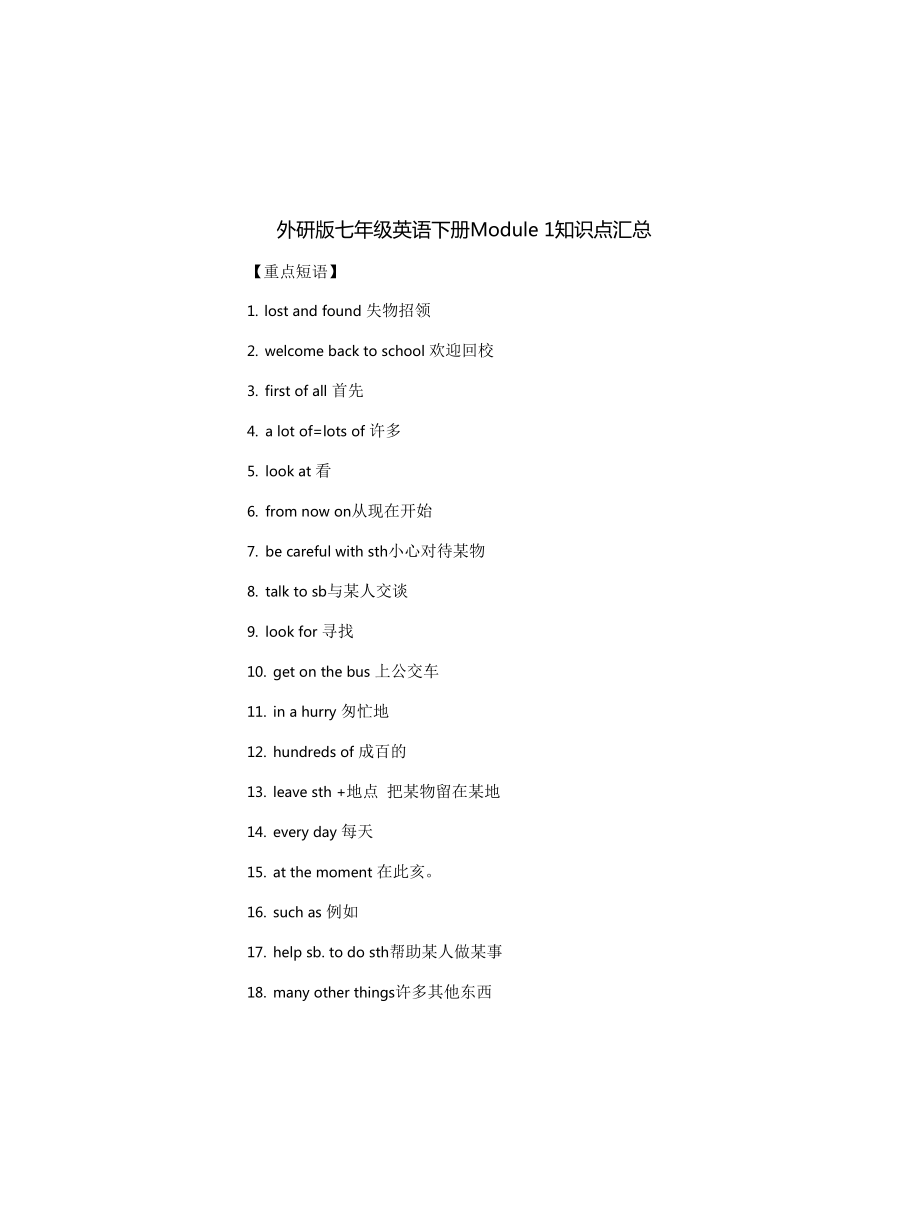《外研版七年級(jí)英語(yǔ)下冊(cè)Module 1知識(shí)點(diǎn)匯總》由會(huì)員分享���,可在線閱讀�,更多相關(guān)《外研版七年級(jí)英語(yǔ)下冊(cè)Module 1知識(shí)點(diǎn)匯總(9頁(yè)珍藏版)》請(qǐng)?jiān)谘b配圖網(wǎng)上搜索��。
1、外研版七年級(jí)英語(yǔ)下冊(cè)Module 1知識(shí)點(diǎn)匯總
【重點(diǎn)短語(yǔ)】
1. lost and found 失物招領(lǐng)
2. welcome back to school 歡迎回校
3. first of all 首先
4. a lot of=lots of 許多
5. look at 看
6. from now on從現(xiàn)在開始
7. be careful with sth小心對(duì)待某物
8. talk to sb與某人交談
9. look for 尋找
10. get on the bus 上公交車
11. in a hurry 匆忙地
12. hundreds of 成百的
2���、13. leave sth +地點(diǎn) 把某物留在某地
14. every day 每天
15. at the moment 在此亥�����。
16. such as 例如
17. help sb. to do sth幫助某人做某事
18. many other things許多其他東西
【重點(diǎn)句型】
1. Welcome back to school, everyone.歡迎大家回到學(xué)校�����。
2. Please be careful with your things from now on.從現(xiàn)在開始請(qǐng)
仔細(xì)看管你的東西����。
3. Whose gloves are they ?它們是誰(shuí)的
3�����、手套����?
4. People often lose things when they're traveling or when they' re in a hurry. They leave things on planes, on trains, on buses and in taxis.人們旅行或匆忙時(shí)經(jīng)常丟東西。他們把東西落在飛機(jī)上�����、火車 上、公交車上或出租車?yán)铩?
5. That' s why there are lost and found office at airports and stations.那就是為何在飛機(jī)場(chǎng)和車站設(shè)有失物招領(lǐng)處的原因���。
【重點(diǎn)詞語(yǔ)解釋】
1. W
4���、elcome back to school, everyone.
歡迎大家回到學(xué)校。
welcome
1) v.歡迎
welcome to school歡迎來(lái)到學(xué)校
welcome home 歡迎回家
Welcome back !歡迎回來(lái)
2) adj.受歡迎的�����。
例如:He is a kind boy, so he is welcome.
他是個(gè)和藹的男孩�����,所以他很受歡迎���。
2. Please be careful with your things from now on.從現(xiàn)在開始請(qǐng) 仔細(xì)看管你的東西。
1) be careful with 小心對(duì)待
例如:Be c
5���、areful with your baby when you are traveling,當(dāng)你旅 行的時(shí)候����,小心照顧好你的小孩����。
2) from now on從現(xiàn)在開始 作為時(shí)間狀語(yǔ)�,一般用在現(xiàn)在時(shí)和 將來(lái)時(shí)態(tài)中�����。
例如:He will work hard from now on.從現(xiàn)在開始����,他將努力 工作。
from then on從那時(shí)開始 作為時(shí)間狀語(yǔ)一般用在過(guò)去時(shí)態(tài) 中
例如:He lived alone from then on.從那時(shí)起��,他就獨(dú)自居住�����。
3. People often lose things when they're traveling or when t
6���、hey' re in a hurry.當(dāng)人們?cè)诼眯谢蚴呛艽颐Φ臅r(shí)候�,他們經(jīng)常會(huì)丟東西�����。
1) when當(dāng)…時(shí)候�,用于引導(dǎo)時(shí)間狀語(yǔ)從句���,表示主從句的動(dòng) 作同時(shí)發(fā)生。
例如:We have lessons when it is September.九月份的時(shí)候我 們開學(xué)��。
2) in a hurry匆忙地�,做狀語(yǔ)。常用于句尾�。
"hurry"V.匆忙。例如:Hurry up 快點(diǎn)�。
He hurried to come into the room. = He came into the room in a hurry .他快速進(jìn)入房間。
4. They leave things on
7��、planes, on trains, on buses and in taxis.
他們把東西落在飛機(jī)上�����,火車上�,公交車上和出租車上�。
1) leave當(dāng)“離開”講,leave A for B離開A地動(dòng)身前往B地�。
2) leave 當(dāng)“落下”講。例如:I left my homework at home.我 把作業(yè)落在家了�。
3) on planes “乘飛機(jī)''還有其他的說(shuō)法?!癰y plane=take a plane=on a plane"
5. That' s why there are lost and found office at airports and stati
8��、ons.那就是為何在飛機(jī)場(chǎng)和車站設(shè)有失物招領(lǐng)處的原因�。
1) That's why…是固定句型�����,后面引導(dǎo)表語(yǔ)從句
例如:that's why he is late for class.那就是他為何遲到的原因�����。
2) at airports在飛機(jī)場(chǎng)���。airport是小地點(diǎn)�,常用介詞“at”
【重點(diǎn)語(yǔ)法】
(一)特殊疑問(wèn)詞引導(dǎo)的特殊疑問(wèn)句
1 . whose 誰(shuí)的
例如: Whose bag is this?
This is Lily's bag.
Whose is this bag?
This bag is Lily's.
2. who誰(shuí)(對(duì)主格和賓格提問(wèn))
例如:
9��、Who runs fastest?誰(shuí)跑得最快�����?
Who do you want to meet ?你想遇到誰(shuí)��?
3 . when and where對(duì)時(shí)間和地點(diǎn)提問(wèn)�����,“何時(shí)何地”
例如:When and where shall we meet?我們何時(shí)何地見面?
4 . how long時(shí)間多久
例如:How long will you stay in Beijing?你將在北京待多久�?
5 . how far距離多遠(yuǎn)
例如:How far is it from here?距離這多遠(yuǎn)?
注意: How far is it from here?
It is a 5 minut
10�����、es's walk from here.
6. how soon多久之后�,用于將來(lái)時(shí),常有in+時(shí)間段 作為 時(shí)間狀語(yǔ)
例如: How soon will you be back?
1 will be back in 3 days
7. how often 表示動(dòng)作的頻率
例如: How often do you take the medicine.
1 take the medicine 3 times a day.
(二)名詞性物主代詞
物主代詞分為形容詞性物主代詞和名詞性物主代詞兩種�。
形容詞性物主代詞放在名詞前作定語(yǔ),相當(dāng)于形容詞��;
名詞性物主代詞相當(dāng)于“形容詞
11����、性物主代詞+名詞”,相當(dāng)于名詞, 可以作主語(yǔ)���、表語(yǔ)或賓語(yǔ)����。
物主代詞
形
容
詞
數(shù)
人稱
單數(shù)
復(fù)數(shù)
第一
my我的
our我們的
人稱
第二
人稱
your你的
your你們的
第三
人稱
his他的�,
her她的��,
its它的
their他們的
數(shù)
人稱
單數(shù)
復(fù)數(shù)
第一
人稱
mine我的
ours我們的
第二
人稱
your s你的
yours你們的
第三
人稱
his他的
hers她的,
its它的
theirs他們的
物主代詞的用法
(1)形容詞性物主代詞放在名詞前作定語(yǔ)��。例如:
12��、
His pencil box is on the desk.
This is our school.
(2)名詞性物主代詞用作名詞�,本身就相當(dāng)于“形容詞性物主代
詞+名詞”,因此���,后面不可再加名詞���。
作主語(yǔ):Richard's school bag is blue and mine is black.里查德
的書包是藍(lán)色的,我的書包是黑色的�。(mine二my school bag)
作表語(yǔ):It's his.這是他的(東西)。
作賓語(yǔ):He borrows your dictionary and you may borrow mine. 他借你的字典�����,你可以借我的���。(作及物動(dòng)詞
13�、的賓語(yǔ))
“of+名詞性物主代詞”可以放在名詞后作定語(yǔ)���,表示強(qiáng)調(diào):
He is a friend of mine,他是我的一個(gè)朋友��。
試比較下面兩個(gè)句子:
This is a photo of mine.這是我的一張照片�。(照片是我擁有的, 但不一定照的是我本人)
This is a photo of me.這是一張我本人的照片�。(照片上是我本 人)
【話題寫作】
作文一:在失物招領(lǐng)辦公室里,大家找到了自己的東西���,都很 高興�。請(qǐng)根據(jù)表格內(nèi)容描述一下各自找到的物品����。
主人
物品
大明
足球、手表
玲玲
錢包���、橡皮擦
我
手套���、相機(jī)
范文:Now we are at
14、 the lost and found office.We are very
happy because we find our lost things here. The football is
Daming's. The watch is his, too.The wallet is Lingling's. The eraser is also hers. Oh! Look! My gloves are here. The camera is mine, too. I think we should be careful with our things from now on .
15�、
作文二:
在公園散步時(shí),你把書包忘在長(zhǎng)椅上了��。書包里面有語(yǔ)文書���、 數(shù)學(xué)書����、英語(yǔ)書和一些練習(xí)本�,還有一個(gè)文具盒和一張學(xué)生卡,上 面有你的姓名�����、班級(jí)��、學(xué)校等信息���。請(qǐng)根據(jù)以上信息寫一則60詞左 右的尋物啟事����。
范文:Lost
Do you see a schoolbag on the bench in the park? Maybe it's mine. I'm sorry to leave it there . There is a Chinese book, a maths book, an English book and some exercise books in it. There's also a pencil box and a student card. There is more information about my name, my class and my school on the student card. Please call me at 82146547.It's very nice of you to do so. Thank you!
 外研版七年級(jí)英語(yǔ)下冊(cè)Module 1知識(shí)點(diǎn)匯總
外研版七年級(jí)英語(yǔ)下冊(cè)Module 1知識(shí)點(diǎn)匯總

